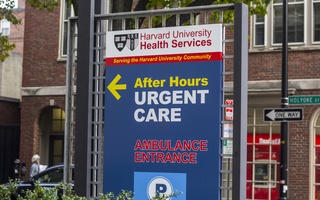In a restructuring of patient resources following the June closure of Stillman Infirmary’s 10 overnight beds, Harvard University Health Services has modified some patient procedures, including those for students seeking care for intoxication.
According to Donald Perlo, the medical director of UHS urgent care, UHS based its decision to release intoxicated students from observation on blood alcohol content under previous protocol. Students had to receive clearance from an internal medicine doctor before leaving, which sometimes required staying overnight. {shortcode-7971f41efe9ce96a876c89bae96e3f0d0e28b635}
Now, students must only be deemed “clinically sober”—meaning they must show vital signs and be alert, able to ingest food and fluids, and able to walk—to leave, Perlo said.
Intoxicated students will also no longer be sent back to UHS after going to Mt. Auburn Hospital and other Cambridge medical facilities.
Perlo, suggesting that UHS adopted the old measures out of an “over-abundance of caution,” said the changes seek to reduce the amount of time that intoxicated students spend at UHS so that it can free up space for other patients seeking urgent care.
“Students are staying until they are well enough to go,” Perlo said, adding that UHS encourages patients to follow up with the Office of Alcohol and Other Drug Services.
The changes in UHS’s approach to handling intoxicated students come almost a year after administrators’ move to shutter Stillman as part of a broader health services restructuring plan prompted pushback from students.
In response to student concerns, administrators agreed to maintain after hours inpatient care services. Now, while UHS still offers 24-hour inpatient service for intoxicated students seeking nighttime care under the College’s amnesty policy, it closed its overnight observation beds this summer, replacing them with reclining chairs and gurneys.
The fifth-floor space that once housed the overnight beds is under construction and will open in October to house expanded counseling and mental health services.
The restructuring has prompted other changes in protocol. In line with UHS’s status as an outpatient medical facility, students may no longer stay there overnight for postoperative accommodations following an elective orthopedic procedure. Student athletes and other patients will have to coordinate with the Athletic Department and the Accessible Education Office to receive further care.
The changes, Perlo said, are “meant to do things in a way that is going to serve more students.”
“By increasing capacity… and having more urgent care, both mental health and medical care, we’re seeing about 3,000 students in a space that used to see 600 students,” he said.
Still, citing research from AODS, Perlo added that only about 10 percent of intoxicated students seek UHS’s care each weekend and suggested that students who do not go to UHS might need urgent care the most. He posited that this underutilization of UHS’s resources may come as a result of some students deciding to provide care for their intoxicated friends on their own.
“We know it’s an issue with the final clubs and the lack of transparency,” Perlo said. “There is probably a significant [amount] of this ... going on there.”
In recent weeks, administrators have raised concerns about alcohol use at Harvard’s final clubs, which are located off campus and remain officially unrecognized by administrators.
Dean of Freshmen Thomas A. Dingman ’67 said UHS and its director, Paul J. Barreira, have been responsive in addressing student concerns throughout the restructuring process.
“A number of adjustments to the plan were made and we’re still getting very good service,” Dingman said. “Some of the communication issues still have had to be ironed out this fall, but I think we’re off to a decent start.”
—Staff writer Celeste M. Mendoza can be reached at celeste.mendoza@thecrimson.com. Follow her on Twitter @CelesteMMendoza.
Read more in College News
Stillman Closed, Health Services Will Open Renovated SpaceRecommended Articles
-
Munter Becomes Chief Of UHS PsychiatristsDr. Warren E.C. Wacker, director of the University Health Service (UHS) announced yesterday two important appointments that may improve the
-
Officials Call for New Measures To Quicken Aid in EmergenciesUniversity officials have called for three new procedures to quicken emergency medical aid following the November 13 death of a
-
 Health Services Sees Decrease in Alcohol Treatment After Hours
Health Services Sees Decrease in Alcohol Treatment After Hours -
 Law School's Pound Hall Will Host Urgent Care Center
Law School's Pound Hall Will Host Urgent Care Center -
 HUHS Overnight Urgent Care to Return to Smith Campus Center
HUHS Overnight Urgent Care to Return to Smith Campus Center













